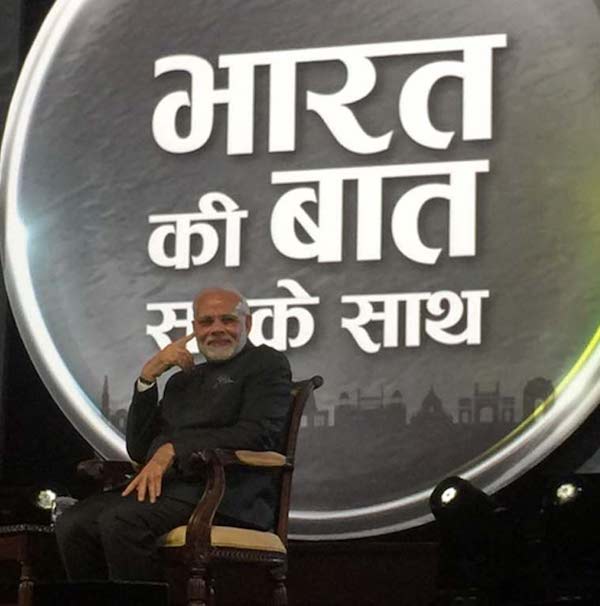Modi launches Bharat Ki Baat Sabke Saath at a meeting with NRIs
LONDON(TIP): Prime Minister Narendra Modi on Monday, April 16, assured his British counterpart Theresa May that the UK’s withdrawal from the European Union offers opportunities to “further increase” bilateral trade ties as the two leaders had “fruitful discussions” on multiple aspects of India-UK relations and issues like counter-terrorism, radicalization and online extremism.
Modi, who arrived at 10 Downing Street for a breakfast meeting, was greeted with the customary handshake by May. “Very welcome to London, Prime Minister,” May said as she greeted Modi.
Both leaders discussed ways to boost cooperation between India and UK.
“Wonderful meeting with Prime Minister @theresa_may at 10, Downing Street. We had fruitful discussions on multiple aspects of India-UK relations,” Prime Minister Modi tweeted after the meeting.
Ministry of External Affairs spokesperson Raveesh Kumar said the two leaders had wide-ranging talks on redefining and infusing new energy into the bilateral engagement post-Brexit.
A statement issued by 10 Downing Street after the meeting said that the Syria air strikes, counter-terrorism, radicalization and online extremism were among some of the key topics covered by both leaders.
“Prime Minister Modi said there would be no dilution in the importance of the UK to India post-Brexit. He said the City of London was of great importance to India for accessing the global markets and would remain so,” a Downing Street spokesperson said.
“The Prime Minister (May) updated Prime Minister Modi on the progress of the UK’s withdrawal from the EU, saying the implementation period agreed in March gives Indian companies and investors the confidence that market access will continue on current terms until the end of 2020,” the spokesperson said.
May reiterated the UK’s position on Russia‘s recent “destabilizing behavior”, underlined by the attack in Salisbury on former Russian double Sergei Skripal and his daughter Yulia and the protection provided for the Syrian regime’s repeated use of chemical weapons against its people.
“They reflected on the progress made on bilateral defense and security cooperation since the Prime Minister’s visit to India in 2016 and the agreement to a number of Defense Capability Partnerships in key strategic areas, with closer military-to-military ties underpinned by a succession of high level visits and exchanges,” Downing Street said.
During a discussion on cooperation between the two countries on legal matters, which is likely to have covered extradition matters, May also welcomed the return to the UK of the “Chennai Six”, the former British soldiers accused of piracy and were freed from an Indian jail last year.
The two leaders said trade between the UK and India had grown strongly over the last year and agreed to build on the recommendations of the UK-India Joint Trade Review to reduce barriers to trade, to make it easier to do business in both countries and enable a stronger bilateral trade relationship for the future.
May and Modi discussed a new UK-India Tech Partnership, which will create thousands of jobs and generate significant investment in both our economies.
Looking ahead at the Commonwealth Heads of Government Meeting (CHOGM) on Thursday, they also agreed on the importance of working together to build a more “sustainable, prosperous, secure and fairer future” for all Commonwealth citizens.
A “flash mob” of sari-clad women from Indian Ladies in UK, accompanied by dhols, had gathered outside Downing Street to welcome the Indian PM with banners such as “In India, Peace is always in Fashion”.
After his meeting with the British Prime Minister, Modi visited the Science Museum to explore the ‘5000 Years of Science and Innovation’ exhibition and interact with Indian-origin and other scientists and innovators based in the UK.
The event, hosted by Prince Charles, included the launch of a new Ayurvedic Centre of Excellence, aimed at creating a first-of-its-kind global network for evidence-based research on yoga and Ayurveda.
A note said the exhibition celebrates India’s role in the history of science and technology by exploring its contributions to subjects including space exploration and engineering.
Modi had landed in Britain from Stockholm for bilateral engagements as well as multilateral discussions as part of the Commonwealth Heads of Government Meeting (CHOGM).
He was received at the airport by UK foreign secretary Boris Johnson, who said he was “excited” that India-UK bilateral trade is growing at 15 per cent a year and the visit will help build on “huge economic advantages”. Both leaders held a late night meeting at Heathrow airport.
According to official estimates, India-UK bilateral trade stands at USD 13 billion, with the UK among the largest G20 investors into India. Modi’s UK visit this week will have a particular focus on the India-UK technological partnership as well as an enhanced role in the Commonwealth.
PM Modi also addressed a meeting of NRIs and launched Bharat Ki Baat Sabke Saath on April 18. He spoke candidly on a number of issues, from the rape of the 8-year-old girl in Kathua to surgical strike in Pakistan, to creating awareness about Yoga and Ayurveda for wellness. He took the opportunity also to bash the Nehru-Gandhi clan and held them responsible for the ills of the country.
A series of demonstrations, including a silent protest to condemn the rape and murder of an eight-year-old girl in Jammu and Kashmir‘s Kathua district, were staged by various groups at Parliament Square during Modi’s visit.
(With inputs from PTI)
